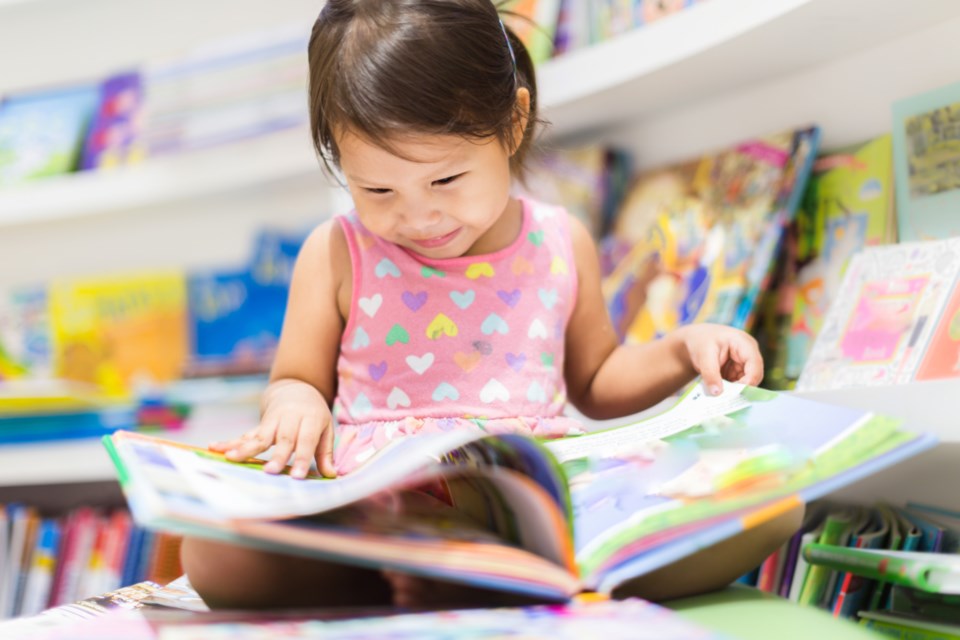It started with Frederick, by Leo Lionni — a beautifully illustrated story about the importance of the arts.
Or it began with The Christmas Miracle of Jonathan Toomey by Susan Wojciechowski — an exquisite storybook about a sullen carver who is transformed by the love of a little boy.
These are some of our own first favourite books. That was before we understood the benefits behind storybook reading. But we gave the books to our nieces and nephews based on our pure appreciation of the stories themselves. And thus began family traditions of carefully selecting, signing and gifting cherished books to one another.
Social and emotional benefits
For educators, the importance of storybook reading in the home is well documented. Reading to children is associated with a heap of benefits, including more expansive expressive and receptive vocabularies, better language comprehension and better early math abilities. More recently, the study of reading has turned to examine the social and emotional benefits provided by storybook reading.
Different themes explored by storybooks can develop aspects of socio-emotional understanding, because a well-written story can transport the reader into fictional worlds and let them experience emotions by proxy.
Parents who are more familiar with storybooks (presumably through reading them with their children), have children who are better at identifying and separating their own emotions and desires from the emotions and desires of others. Such social and cognitive skills are part of developing towards what psychologists call a “theory of mind” — gaining the ability to understand that other people’s thoughts and beliefs may be different from your own, and to consider why.
Books may help children develop such skills and insights because the plots often focus on social relationships between characters and contain rich language related to feelings and identity formation. Books can also encourage children to think of ways to enrich the lives of those around them, thereby enriching their own.
Of course, it’s not enough to simply own many books; it’s the frequency of shared storybook reading with the quality of time that matters. But whether books are borrowed from the local library, or part of your own collection, having access to them in your home is a good place to start.
Here are some of our favourites.
Books that explore themes of love and community: Porcupine’s Bad Day by Emilie Corbiere is an English- and Ojibway-langugage account of how porcupine’s friends help him move beyond his grumpy mood as he tries to sleep in the daytime — and to understand they all share the forest. Nancy Tillman’s I’d Know You Anywhere, My Love explores how intimacy and love are tied to recognition and acceptance, told through the delight of animal disguises and a woman narrator. Max and the Tag-Along Moon by Floyd Cooper narrates the love of a boy and his grandpa against the backdrop of the moon’s ever-present mystery.
Books that celebrate the occasional misstep in creativity: The Book of Mistakes by Corinna Luyken, The Most Magnificent Thing by Ashley Spires, and Ish or The Dot, by Peter Reynolds. The Dot is about a schoolgirl, Vashti, who goes from believing she can’t draw to a celebration of self-expression and creativity — beginning with a dot. These books would make wonderful gifts for the creative but cautious children in your lives.
Books for young budding professionals: Andrea Beaty’s books, including Ada Twist, Scientist and Iggy Peck, Architect would make wonderful presents that showcase new worlds opening up through science and design, and that show children the road to success is often littered with road blocks that can be overcome.
Books that embrace challenge: What Do You Do With An Idea by Kobi Yamada is an encouraging book suitable for all ages. After the Fall (How Humpty Dumpty Got Back Up Again) by Dan Santat contains themes of perseverance and overcoming fears.
Books that celebrate themselves: The Good Little Book by Kyo MacLear, and It’s a Book by Lane Smith are stories about the love for reading, and the value of a good book. These support the message that reading is a beautiful thing. A Child of Books by Oliver Jeffers and Sam Winston is a lyrical celebration of a childhood filled with books.
Books that don’t take themselves too seriously: Chester by Mélanie Watt, The Book With No Pictures by B.J. Novak, Oddsockosaurus by Zanib Mian and I Want My Hat Back by Jon Klassen all provide a shared giggle between adult and child. Books like these reinforce the value that reading is a fun and intrinsically enjoyable activity.
Above we’ve included some of our favorite titles, but there is no one perfect book. We encourage you to spend some time talking to your local bookshop staff or librarians to find titles that will resonate in your family.
The psychosocial and educational benefits from shared storybook reading do not depend on whether the books are bought or borrowed or whether they’re new or used. All you need are books with convincing characters, good conversations and a place to snuggle up and read.
Sandra Martin-Chang, Professor, Department of Education, Concordia University and Stephanie Kozak, PhD Candidate, Concordia University
This article is republished from The Conversation under a Creative Commons license. Read the original article.
